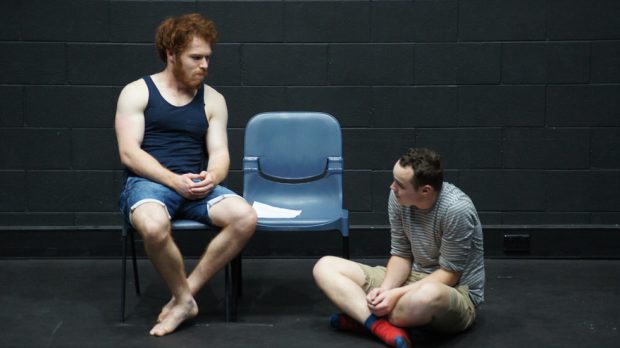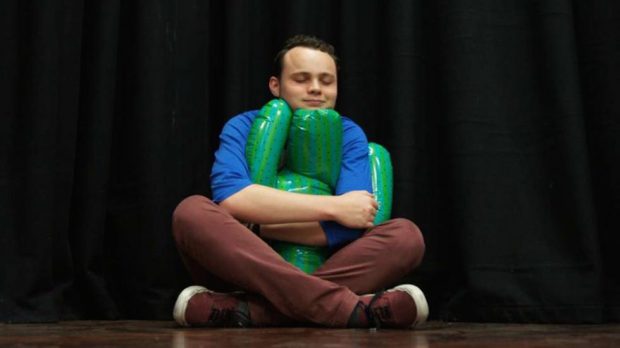
When emerging Perth playwright Nicolas Tan debuted Five, Six as a 10 minute short play in 2016 he knew it was just the start of a bigger story he wanted to tell. The first incarnation was successful, selected as part of the Tantrum Youth Arts’ Hissyfest 2016 in New South Wales, but for Tan something closer to home was at play. Based 10 years ago, Five, Six tells the story of two teenage brothers finding out a lot more about themselves and each other than they expected as their parents travel abroad, leaving them home alone. The coming of age story is coloured with down-to-earth dialogue uncovering the challenges of OCD and coming out as a teenager. BRAYDEN EDWARDS caught up with Nicholas Tan to talk about his exciting directorial debut, and how it felt bringing deeply personal experiences to life on stage. Five, Six is showing at Studio 411 at Murdoch University as part of the expanded FRINGE WORLD across various dates between Thursday, February 8 and Friday, February 23.
This show Five, Six originally ran for ten minutes as part of its selection at the Short Play festival Hissyfest. What was it that made you want to expand it to a full-length production?
When I saw Five, Six produced at Hissyfest, I knew that the story wasn’t complete. At the same time, the director of the 10 minute Five, Six, Allison Van Gaal, encouraged me to continue writing. Then, with the call out for FRINGE WORLD 2018, I knew this was my chance to push myself and expand the piece. I wanted to explore the world of the play a bit more, but most importantly I wanted the characters to “get real”.
Five, Six also marks your debut as a producer and director. As someone who as put their hand to multiple aspects of theatre, what were you required to do or learn in these new roles that maybe you weren’t expecting?
It’s a rewarding but tough experience taking on both of these roles. I’ve been to producer workshops and read a bit here and there but there are so many things that you just have to deal with on the spot. As a writer, you have a vision but once you have your producer hat on, the reality of finances hits you. Then, as a director, you have to find a way to stage it with limited resources as circumstances change.
Something that is definitely challenging as a director is the directing and staging of OCD behaviour. In the 10 minute piece, we see the character, Joel, for such a short time. But now, as a longer show, I find that it’s tricky to get the right rhythm with the OCD, so I’ve been tweaking and working on that.
And what team do have along for the ride that are helping bring this to life?
There have been many who have offered help in whatever way they can but in terms of our core team for FRINGE WORLD, I have been blessed to have four great actors: Calum Costelloe, Josh McGee, Stephane Latchman and Noah Way. They have been so professional and committed to the project and I’m sure each one has a great future in acting.
Behind the scenes, I have my best friend, Leon Gianni, who handles all the photography and poster marketing and design, and my brother, Zac. They’ve been a sounding board for my thoughts and have helped me organise some of the logistics of the project.
You certainly haven’t shied away from tackling some challenging issues in this show. Why did you feel compelled to bring some of the themes and ideas in Five, Six out into the open in theatre form?
I think theatre brings an element of risk, which is what this story requires – the play is unfolding in front of a live audience. Risk is also something that I feel that I need, as a creative, to improve my practice. You can’t pause a theatre performance. It does put pressure on the actors and myself but if done properly, it will be a rewarding experience for the audience and for the team.
The other thing is that at this current moment, I’m more dialogue-focused and I believe that theatre gives me a great opportunity to test my dialogue writing skills.
You’ve said the show is informed by identity politics and the theme for its original incarnation for the Hissyfest was to be “out of place.” Did the idea for Five, Six come from personal experience or did you find inspiration in other artists that might have found creative work a helpful way to come to terms with feeling like a bit of an outsider in society?
The idea of Five, Six came from my personal experience both as an outsider but also from this habit that I developed from a young age of having to count things and steps to make sure that something is “complete.” I didn’t realise how much of a problem it was for me until I started missing the bus because I had to feel the light switch at least a few times until I was satisfied that the light was turned off even though I could see that the light was obviously turned off. It was the same with kitchen switches as well of course. The challenge for me as a director is how to direct Calum (who plays Joel) to perform this behavior.
In terms of identity politics, there’s quite a few indie plays in Perth that deal with identity politics but what I find is that there seems to be a certain flamboyance or amplification of the props and visual effects. I once read or heard that there are two types of outsiders who will make a difference to the world – the loud rebellious rockstar who is “out there” and the second is the reflective nerd who is hiding behind his or her books but is always thinking. Most of the plays that I have seen tend to be of the “rebellious” kind and so what I wanted to do was to see if I could make a play dealing with identity politics that brings intensity rather than amplification.

The theme of sexuality has become so politicised in recent years in Australia with the Same Sex Marriage plebiscite and continuing policy posturing and campaigns from either side. Do you feel there was a disconnect between the mass opinion polling, for example, and the uniqueness of individuals’ personal experiences that were affected by it?
Although it was kind of expected I’m relieved that the Yes vote passed. I believe it was definitely a waste of money and a show of cowardice from the government. And the fact that some government MPs abstained during the vote in Parliament showed that regardless of the outcome of the plebiscite, they still couldn’t vote in accordance to the majority will of the people. At the same time, I found myself questioning my fellow citizens. Someone on my Facebook page mentioned that he believed that people are generally influenced by prejudice and ignorance. I found myself questioning whether I believed in the goodwill of my neighbours.
Leading up to the plebiscite, I was reading articles from people in the US who were either brought up by same-sex couples or were in a same-sex relationship and yet were against same-sex marriage. I found these stories quite troubling but definitely something that I couldn’t just ignore.
Despite it seeming like such a contemporary idea to bring to life in a story, this is actually based 10 years ago. What were the reasons for that?
I have a nostalgia for the 90s and early 2000s, so I notice myself going back to this time period in other work that I’ve been developing. The other reason for setting the story 10 years ago is that I didn’t want to forget or take for granted the current awareness and knowledge that we have now of gender and sexuality, mental health, bullying and other issues that the play deals with. Also, especially in regards to the theme of sexuality, I didn’t want to set the play during the AIDS crisis.
Despite the depth of themes and ideas here, is there a fun and comedic aspect to the play as well? What do you want people to feel, experience and take way from the performance?
There are definitely moments in the the play that are funny and I hope the audience will enjoy these while also feeling or at least understanding the struggles that the characters go through. I hope that the audience will be engaged with characters. I think most importantly, for me, is for the audience to remember that firstly, the story doesn’t finish with the play. And second, the characters are not always right.